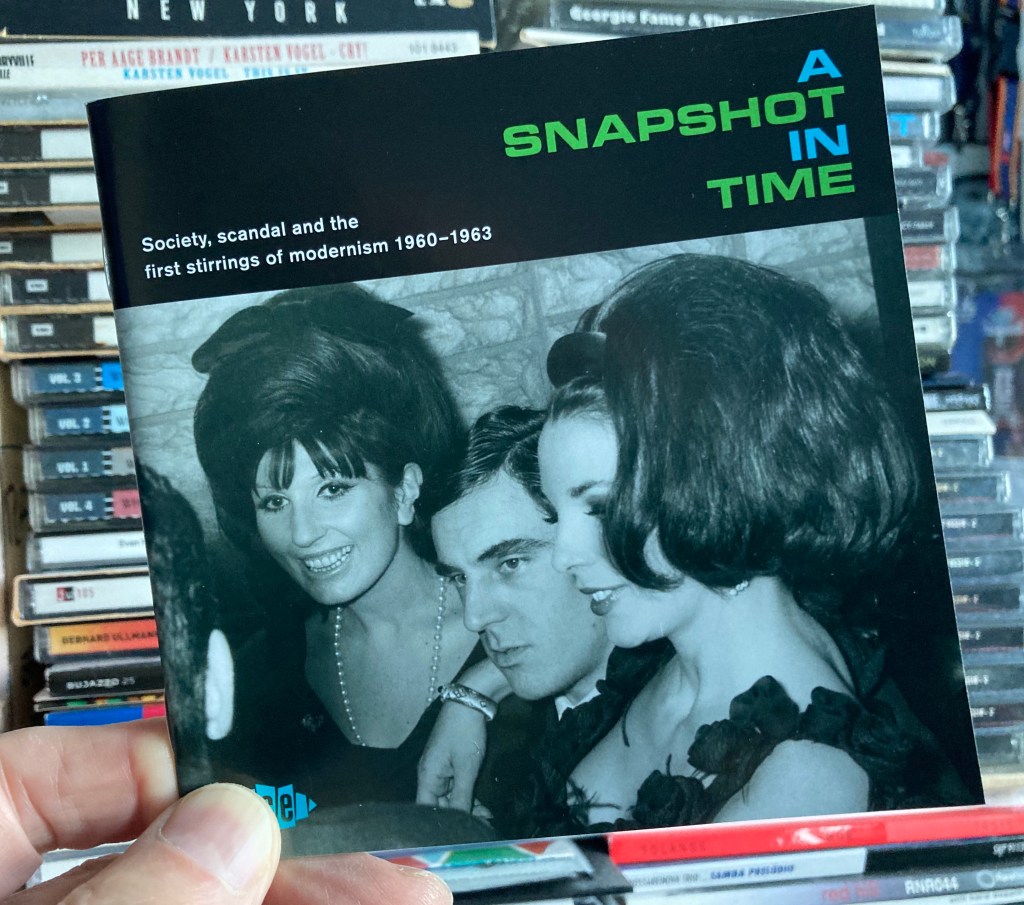Just before the world changed
Sixty years ago this month, “Love Me Do” made the charts and the world changed. But what was it changing from? Not just the drab, complacent cardigans-and-Billy Cotton caricature of post-war British culture. Before the Beatles and Stones came along to provide a focus, there were plenty of signs, if you were looking, that something was about to happen. And two dozen of them are collected in A Snapshot in Time, a new compilation of sounds from 1960-63 that can be seen today as a series of premonitions.
I was 15 at the time, primed for change and and looking for those signs, in particular anything that resembled the incursion of the blues or modern jazz into mainstream pop music. “Sugar Baby Pts 1 and 2” by Jimmy Powell, a raw-voiced R&B singer from Birmingham was one. The more decorous Lyn Cornell — formerly of Liverpool’s Vernons Girls — singing Jon Hendricks’s lyric to Bobby Timmons’ “Moanin'” was another. Anthony Newley’s skewed Cockney-hipster version of “Strawberry Fair”, too. They’re included in this collection, which is subtitled “Society, scandal and the first stirrings of modernism 1960-63”.
One of the defining events of this fast-changing culture was the broadcast of the first episode of the satire show That Was the Week That Was by the BBC in November 1962. One track is a reminder of the national mood caught and amplified by TW3: “Christine” by Miss X exploits the Profumo affair in a cocktail-piano rhumba punctuated by lubricious faux-ingénue vocal interjections from Joyce Blair (sister of Lionel). Produced by John Barry, with the piano played by the Spanish aristocrat and film actor Jaime Mora y Aragón, and released on Jeff Kruger’s Ember label, it was propelled into the lower end of the charts by scandalised newspaper stories.
More seriously indicative of the future was the music evolving among those who had come out of the skiffle, folk and trad scenes, like Long John Baldry singing Willie Dixon’s “Built for Comfort” with Blues Incorporated, the guitarist Davy Graham’s solo set-piece “Anji” and two tracks, “Country Line Special” and “Chicago Calling”, released as the first single by the singer and harmonica player Cyril Davies, the Ken Colyer of British R&B. Others also came by way of the jazz scene, like the tenorist Red Prince with the Danger Man theme and the trombonist Don Lang with “Wicked Woman” (composed by the person who was to become P. J. Proby). Oh, and Sounds Incorporated’s Markeys-like “Sounds Like Locomotion” and “Why Should We Not”, Manfred Mann’s first single, a jazz-waltz instrumental heavy on alto saxophone, organ, harmonica and tom-toms.
A number of the tracks — including those by Powell, Lang and Cordell — came into being because Jack Good, the great producer of the TV show Oh Boy, had an A&R deal with Decca Records. Good was a visionary who wrote columns in the music press extolling the virtues of US records such as Gene Chandler’s “Duke of Earl” and Bruce Channel’s “Hey Baby” (which, of course, provided the inspiration for John Lennon’s harmonica on “Love Me Do”). Among the three Powell tracks is a version of “Tom Hark”, a South African kwela song that had been a hit for Elias and his Zig-Zag Jive Flutes, a pennywhistle band from Johannesburg, in 1958.
The track that sums it up best for me is “Orange Street”, a finger-snapping instrumental by the Blue Flames, with Georgie Fame on Hammond organ. I bought it on a school trip to London and yearned to be a part of the groovy scene to which it provided a soundtrack. Pretty soon, we all were.
* A Snapshot in Time, compiled by Rob Finnis and Roger Armstrong, is released on the Ace label.

